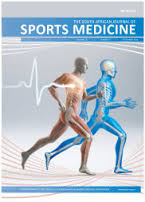Effectiveness of self-management programmes for athletes with patellofemoral pain syndrome: A systematic review
DOI:
https://doi.org/10.17159/2078-516X/2025/v37i1a18648Abstract
Background: Patellofemoral pain syndrome (PFPS) is a common condition that can severely hinder an athlete's ability to perform and compete at their full potential and overall well-being. The emergence of self-management programmes presents a potential treatment avenue for athletes with PFPS. Self-management programmes aim to empower patients through education, symptom monitoring, tailored exercises, and gradual activity progression while respecting pain thresholds. Despite their potential benefits, limited data evaluates the effectiveness of self-management programmes specifically tailored for athletes with PFPS.
Objectives: To assess the effectiveness of self-management programmes in improving pain and functional ability among athletes with PFPS.
Methods: A systematic search was conducted across PubMed/MEDLINE, Cochrane Library, CINAHL, and PsycINFO databases. Randomised and non-randomised controlled trials comparing self-management interventions to other treatments or control groups for improving pain and functional ability among athletes with patellofemoral pain syndrome were included. Studies including athletes with PFPS (defined as pain persisting for ≥12 weeks) were eligible. Four reviewers independently extracted data and assessed quality using the Physiotherapy Evidence Database (PEDro) scale.
Results: Three trials involving 139 participants met the eligibility criteria. Identified self-management programmes comprised exercises, mindfulness training, and educational programmes tailored to athletes. Two of the eligible studies identified found that exercise consisting of the combination of mindfulness and/or dry needling reported an enhanced recovery rate in the studied population with regards to PFPS. The other study reported no added benefit whether exercise or education was used as a modality for the self-management of PFPS.
Conclusion: While some studies showed promising results for self-management programmes involving exercises and mindfulness in managing patellofemoral pain syndrome among athletes, the overall evidence could be more extensive and consistent. High-quality controlled trials with consistent methodology and athletic populations are needed to identify the most effective self-management approaches for patellofemoral pain syndrome in athletes.
Downloads
Downloads
Published
Issue
Section
License
Copyright (c) 2025 South African Journal of Sports Medicine

This work is licensed under a Creative Commons Attribution 4.0 International License.
The South African Journal of Sports Medicine reserves copyright of the material published. The work is licensed under a Creative Commons Attribution 4.0 (CC BY 4.0) International License. Material submitted for publication in the South African Journal of Sports Medicine is accepted provided it has not been published elsewhere. The South African Journal of Sports Medicine does not hold itself responsible for statements made by the authors.
How to Cite
- Abstract 259
- PDF 271





.png)